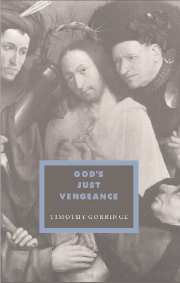Book contents
- Frontmatter
- Contents
- General editors' preface
- Acknowledgements
- List of abbreviations
- 1 Religion and retribution
- PART I THE CULTURAL FORMATION OF ATONEMENT: BIBLICAL SOURCES
- PART II MAKING SATISFACTION: ATONEMENT AND PENALTY 1090–1890
- PART III CONTEMPORARY DIRECTIONS IN ATONEMENT AND PENAL THEORY
- Select bibliography
- Index
- CAMBRIDGE STUDIES IN IDEOLOGY AND RELIGION
1 - Religion and retribution
Published online by Cambridge University Press: 25 January 2010
- Frontmatter
- Contents
- General editors' preface
- Acknowledgements
- List of abbreviations
- 1 Religion and retribution
- PART I THE CULTURAL FORMATION OF ATONEMENT: BIBLICAL SOURCES
- PART II MAKING SATISFACTION: ATONEMENT AND PENALTY 1090–1890
- PART III CONTEMPORARY DIRECTIONS IN ATONEMENT AND PENAL THEORY
- Select bibliography
- Index
- CAMBRIDGE STUDIES IN IDEOLOGY AND RELIGION
Summary
Christianity is Parcel of the Laws of England: Therefore to reproach the Christian Religion is to speak in Subversion of the Law.
Matthew Hale, Lord Chief JusticeBy the satisfaction of justice, I mean the retribution of so much pain for so much guilt; which is the dispensation we expect at the hand of God, and which we are accustomed to consider as the order of things that perfect justice dictates and requires.
William PaleyJohn Fletcher, of Madeley, is one of the most attractive figures of the eighteenth-century English church. Born and brought up in Switzerland, and attending university at Geneva, he learned English only after coming to Britain in his early twenties, and his early sermons, at any rate, were delivered with so thick an accent that English congregations found him difficult to understand. He had intended to be a soldier, but a series of accidents prevented him, and on coming to England he came under Wesley's influence, took up residence in Madeley, and after ordination by the Bishop of Bangor began to assist the incumbent. About Madeley it was observed that it was ‘remarkable for little else than the ignorance and profaneness of its inhabitants, among whom respect to men was as rarely observed as piety towards God’. When the vicar died in 1760 Fletcher was offered the living and accepted, even though he was simultaneously offered one of much greater value. He remained at Madeley for the rest of his life, twenty-five years.
- Type
- Chapter
- Information
- God's Just VengeanceCrime, Violence and the Rhetoric of Salvation, pp. 1 - 30Publisher: Cambridge University PressPrint publication year: 1996



